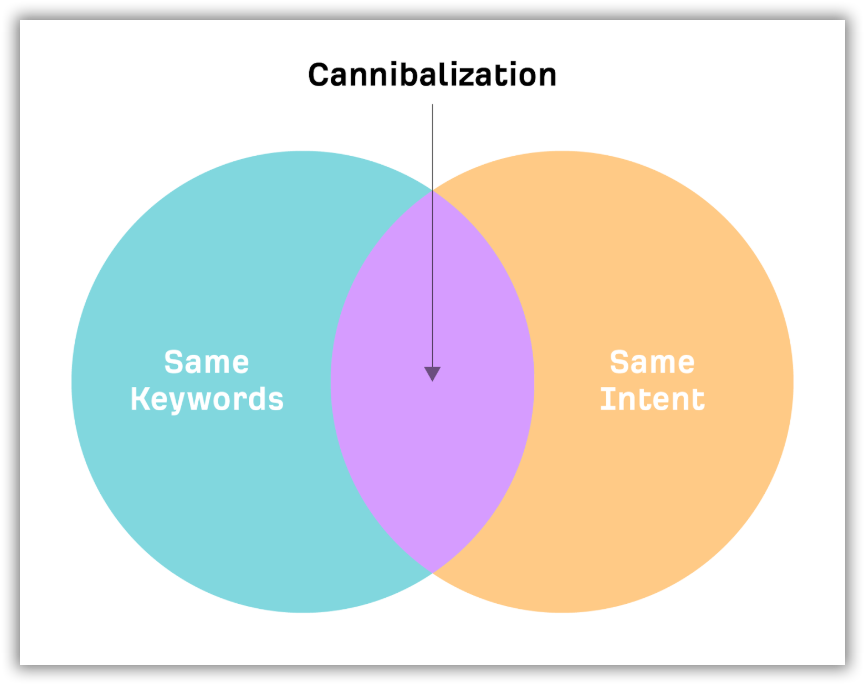
Keyword cannibalization is a subtle yet impactful issue that can significantly hinder your site's SEO performance. It occurs when multiple pages on your website compete for the same or similar keywords, inadvertently weakening each other's chances of ranking well.
Instead of complementing one another, these pages split traffic and authority, ultimately harming your site’s overall visibility and growth. Fortunately, understanding and addressing keyword cannibalization can restore harmony to your content strategy and enhance your organic search success.

At its core, keyword cannibalization happens when multiple pages on the same website target the same keyword (or very similar phrases). This internal competition harms your site's overall SEO performance, as search engines struggle to determine which page should rank for a given query. Instead of consolidating authority and relevance around a single page, you end up splitting it, which weakens your position across the board.
This issue is often an unintended consequence of organic content growth—especially on larger sites where SEO planning isn’t always carefully coordinated. As your site expands, pages can easily target overlapping keywords, causing them to compete for the same search results rather than working together to cover different angles.
Keyword cannibalization can severely limit your site’s ability to capture search traffic and achieve its growth potential. When multiple pages vie for the same search terms, your site risks:
● Reduced Rankings: Instead of securing high-ranking positions for multiple pages, you may see all pages drop in rankings as they vie for position.
● Lower Click-Through Rates (CTR): Searchers may skip over listings from the same site, perceiving them as repetitive.
● Lost Conversions: Traffic is split among competing pages, which can lead to lower conversion rates as user intent is fragmented.
● Wasted Efforts: Optimizing multiple pages for similar keywords can lead to diminished returns, wasting resources that could have been better utilized elsewhere.
Cannibalized keywords also reduce opportunities to rank for other relevant, long-tail, or geographically targeted terms. In addition, poor organic visibility may drive you to rely more on paid advertising, straining your budget without fully capitalizing on organic search potential.
Here are some common scenarios where keyword cannibalization can occur:
● E-commerce product variants – Targeting “green dress” on both the product and category pages. These pages end up competing with each other rather than targeting different, complementary queries like “green dress for parties” vs. “green summer dress.”
● Location Pages – Optimizing both a city page and a neighborhood page for the same keyword, like “Boston restaurants,” instead of distinguishing between "restaurants near Fenway Park" and "restaurants in Downtown Boston."
● Blog Silos – Two different blogs (e.g., a general lifestyle blog and a health-focused one) target similar keywords like “how to get better sleep” without tailoring content to different user intents.
● Service Pages – A general “web design services” page and a more specific “e-commerce web design services” page both targeting the same “web design cost” keyword can end up fighting for relevance.
● Link Clusters – Creating doorway pages to build links that all target the same exact-match keyword—this is an easy route to cannibalization if you don’t have a strategic internal linking structure.
Whenever multiple pages target the same main keyword without differentiation, you open the door for self-competition.
Before you can fix keyword cannibalization, you need to identify it. Fortunately, there are plenty of tools and strategies to spot keyword conflicts:
● SEO Platforms – Tools like SEMrush offers site audits that can highlight pages competing for the same target keyword. It can point out overlapping rankings and traffic, helping you identify pages that might be cannibalizing each other.
● Google Search Console (GSC) – You can also use GSC to spot cannibalization issues. Look for keyword overlaps in the "Performance" section, focusing on pages that appear for the same queries. Use filters to find pages that might have declining impressions or rankings for specific keywords.
● Analyze Rankings and Traffic – If you see multiple URLs appearing for the same search term or frequent fluctuations in ranking for the same keyword, it’s a sign that something’s off.
There are a few key indicators that suggest keyword cannibalization may be affecting your site:
● Rankings Decline: Pages that previously performed well suddenly see a drop in rankings for their targeted keywords.
● Multiple Results for the Same Keyword: Seeing multiple pages from your site in the search results for the same query may indicate cannibalization.
● Similar Traffic Trends: Pages with identical fluctuations in traffic or rankings might be competing with each other.
● Rising PPC Costs: Increased reliance on paid search to maintain visibility could be a sign that organic traffic is compromised.
● Content Team Confusion: Teams may write new content without realizing similar pages already exist, leading to unnecessary duplication.
Once you’ve pinpointed the problem pages, you can use these strategies to resolve the issue and optimize your site for maximum visibility:
Make sure each page has a distinct purpose. Adjust on-page content to target secondary or related keywords that add unique value. You want your pages to complement each other, not compete.
Combine similar pages into a single comprehensive resource. Merge articles or posts that share the same main topic and redirect the URLs of the now-deleted pages to the new one. This helps consolidate link equity and makes your site’s topic coverage stronger.
Redirect duplicate or lower-value pages to a primary URL using a 301 redirect. This helps channel link equity from those pages to the one you want to rank higher, and it signals to search engines that the redirected page’s authority should be transferred.
Optimize your content to cover different stages of user intent, like creating one piece for “how to start a podcast” and another for “advanced podcasting strategies.”
When the same topic applies to different regions or languages, create pages tailored for each to maximize coverage.
Fixing current issues is great, but you also need to put preventive measures in place:
1. Centralize Keyword Research: Maintain a master document to track which keywords are targeted across your site. Before creating new content, check that your target keyword isn’t already in use.
2. Document Keyword Targeting Choices: Keep detailed records of why you chose specific keywords, so future content creators can understand the strategy.
3. Align Your Content Team: Ensure everyone on your team is aware of the guidelines for unique keyword targeting.
4. Regular Audits: Schedule quarterly audits using your SEO tools to catch potential issues before they escalate.
5. Track Redirects: Make sure that merged content is still passing authority effectively. Monitor these redirects to ensure they’re working as intended.
Keyword research isn’t just for finding new opportunities; it’s essential for avoiding future cannibalization. Always begin by:
● Identifying Gaps: Look for terms your site isn’t covering well.
● Grouping Keywords: Create clusters of related terms that can be targeted by a single page.
● Analyzing Current Content: Before adding new content, see what’s already ranking and identify potential overlaps.
A strong internal linking strategy helps guide search engines to the most authoritative page on a topic. Link related content to your pillar page to distribute relevance and avoid internal competition. This strategy also helps reinforce the “winner” page, signaling its importance to search engines.
No, keyword stuffing involves overloading a single page with repeated keywords to manipulate rankings. Keyword cannibalization is about multiple pages competing for the same term.
In very niche scenarios, brands may use cannibalization strategically to capture more search real estate, but for most sites, it leads to wasted efforts and lost opportunities.
Absolutely. By targeting distinct long-tail or related phrases, you can cover different user intents without your pages competing.
Keyword cannibalization is a subtle but powerful threat to your site’s SEO success. By consolidating authority, optimizing for distinct user intents, and ensuring your content strategy remains aligned, you can avoid this pitfall and unlock your site’s full potential. Remember, the goal is not to create competition within your own site but to create content that serves users and search engines efficiently.
Take the time to address cannibalization, and your rankings, traffic, and conversions will be better for it. Keep monitoring, auditing, and improving your site to maintain a well-organized content strategy that maximizes SEO value. After all, the true power of SEO comes from ensuring your site speaks with one clear voice. Let that voice be heard loud and clear. Don't let keyword cannibalization hold back your SEO potential. Take charge of your strategy with FoxAdvert and unlock the true power of your digital marketing.